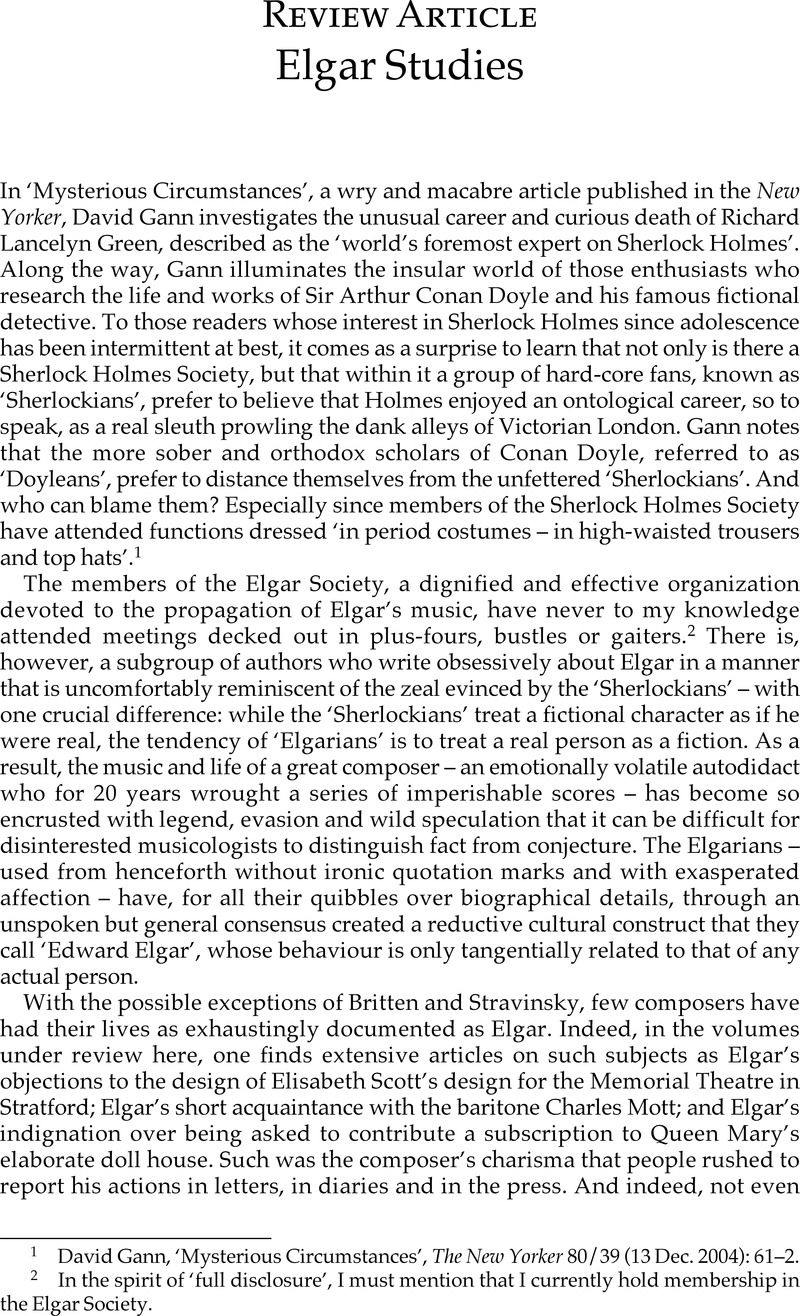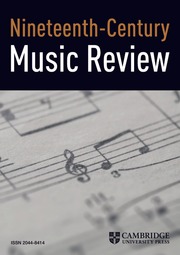No CrossRef data available.
Article contents
Elgar Studies
Published online by Cambridge University Press: 13 April 2011
Abstract

- Type
- Review Article
- Information
- Copyright
- Copyright © Cambridge University Press 2007
References
1 Gann, David, ‘Mysterious Circumstances’, The New Yorker 80/39 (13 Dec. 2004): 61–2.Google Scholar
2 In the spirit of ‘full disclosure’, I must mention that I currently hold membership in the Elgar Society.
3 A cursory glace at Alice Elgar's diaries renders the testimony of Mrs Richard Powell (‘Dorabella’ of the ‘Enigma’ Variations) that ‘no mention was ever made in a diary of anything disagreeable or vexing’ as patently absurd. See Mrs Powell, Richard, Elgar, Edward: Memories of a Variation, 3rd ed. (London: Methuen, 1949): 64Google Scholar.
4 Sassoon, Siegfried, Diaries 1920–1922, ed. Hart-Davis, Rupert (London: Faber and Faber, 1981): 293.Google Scholar
5 Anderson, Robert, Elgar and Chivalry (Rickmansworth: Elgar Editions, 2002): 189–90.Google Scholar
6 Porter, Bernard, ‘Elgar and Empire’, in O My Horses!: Elgar and the Great War, ed. Foreman, Lewis (Rickmansworth: Elgar Editions, 2001): 141.Google Scholar
7 Letter of 25 August 1914. One can only wonder what Schuster, who, while an ardent admirer of Elgar's music had no illusions as to his hero's foibles, made of sentiments such as these: ‘I walk round & round this room cursing God for allowing dumb brutes to be tortured – let Him kill his human beings but how CAN HE? Oh, my horses’. Schuster did take the trouble to preserve this embarrassing epistle, however, presumably for posterity: correspondent's revenge? For the most convincing short commentary on this sorry epistle, see Kennedy, Michael, Portrait of Elgar (Oxford: Oxford University Press, 1968): 219Google Scholar.
8 Trowell, Brian, ‘The Road to Brinkwells: the Late Chamber Music’, in Oh, My Horses!, ed. Foreman, Lewis: 353.Google Scholar
9 Anderson, Robert, Elgar (New York: Schirmer Books, 1993)Google Scholar : 4. Julian Ruston is surely mistaken to have interpreted Elgar's indifference as reticence in order to accept Trowell's unconvincing theories about Helen Weaver.
10 Kennedy, Michael, The Life of Elgar (Cambridge: Cambridge University Press, 2004): 25–7.Google Scholar
11 The happy exceptions to the poor illustrations that pervade The Best of Me are the droll cartoons, attributed to T. Martin Jones, that are adequately reproduced between pages 268 and 274. These drawings take for their captions lines drawn from Newman's poem as set by Elgar, including both literary and musical quotations. The most amusing of these cartoons depicts a suffragette – who bears a marked resemblance to Dame Ethyl Smyth – being transported to jail by two jolly bobbies; the caption underneath reads: ‘a uniform and gentle pressure tells me that I am not self-moving, but bourne forward on my way.’
12 Is there any statement more touching in such a circumstance than the common declaration ‘It would have been completely against his character’? Who, enduring such suffering as did Gorton in his last years, would not have been tempted to end such physical deterioration given an opportune moment and circumstance? If Gorton did indeed drown himself under these circumstances, he can scarcely be censured . Hodgkins, Geoffrey, Somewhere Further North (Rickmansworth: Poneke Press, 2004): 243–4Google Scholar.
13 Quoted in Bury, David, Elgar and the Awful Female and Other Essays (Rickmansworth: Elgar Editions, 2003): 39.Google Scholar
14 Ibid.: 39.
15 Ibid.
16 Bury, , Awful Female: 40.Google Scholar
17 Consider, for example, Kennedy's bitter riposte to Copland's critique of Vaughan Williams's Benedicite . Kennedy, Michael, The Works of Ralph Vaughan Williams, 2nd ed. (Oxford: Oxford University Press, 1980): 226Google Scholar . For Kennedy's resentment of an American caught poaching upon Elgarian preserves, see The Life of Elgar: 93–4.


